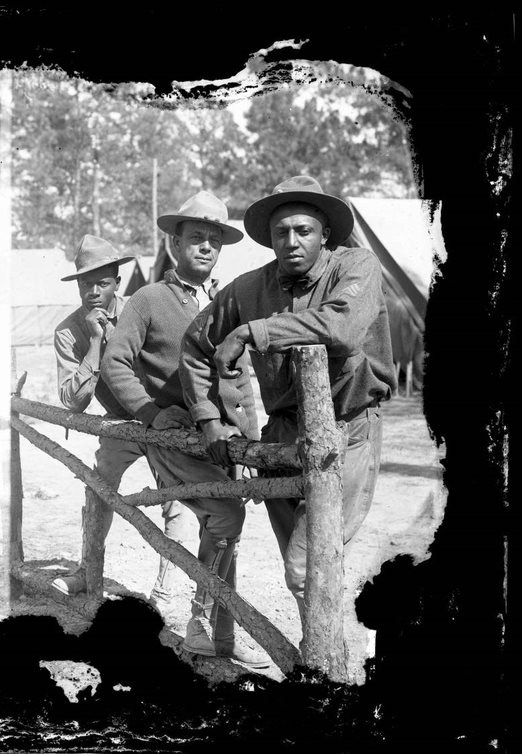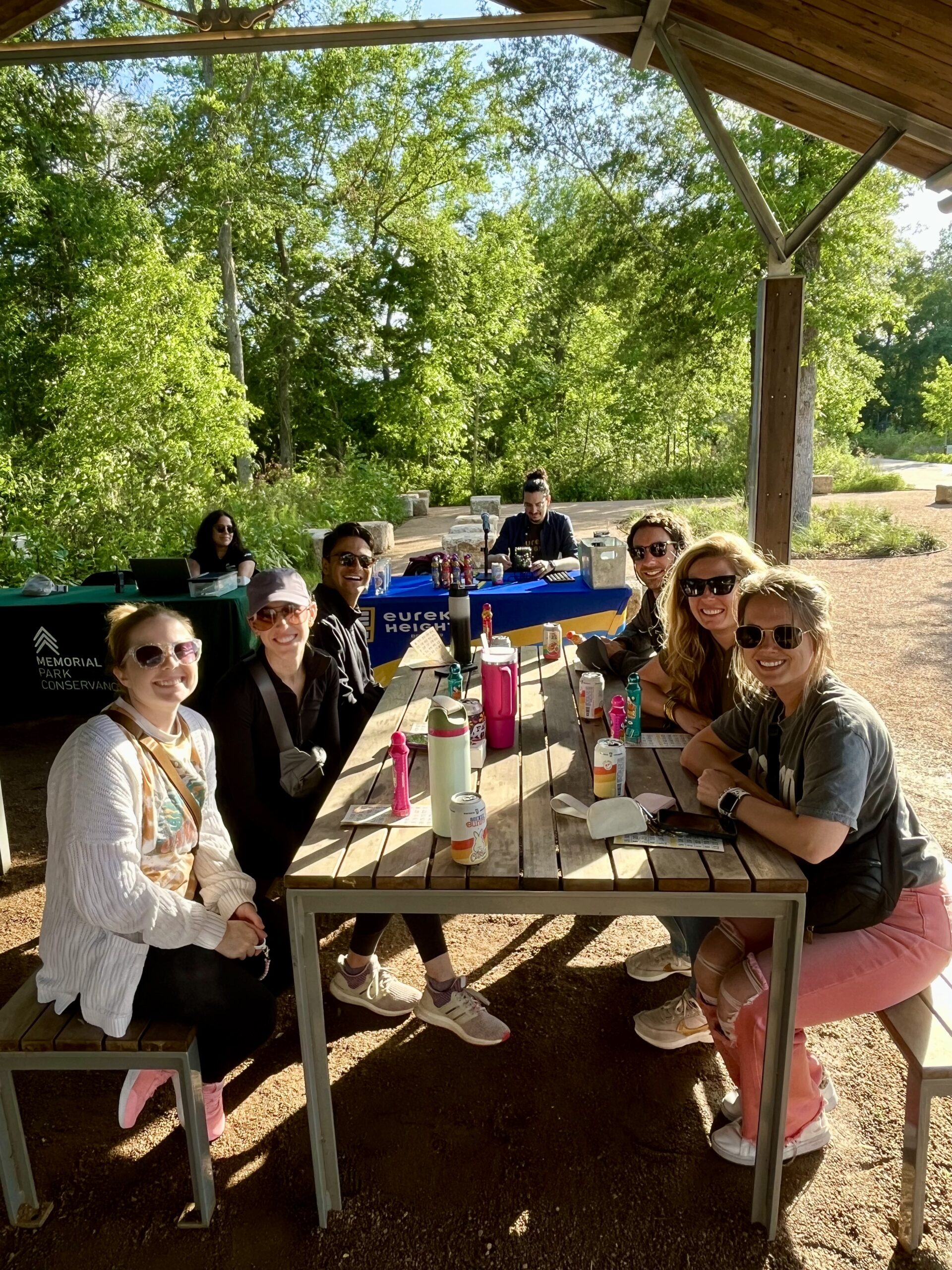Park Conversations: Remembering and Honoring the Soldiers of the 3rd Battalion, 24th Infantry Regiment
Audio Stories
Through ten onsite audio experiences, situated throughout the Clay Family Eastern Glades, you will hear from descendants and community members connected to these events, reflecting on their impact over a century later.
Listen to the stories here:
Listen to Jaime González as he talks about the origins of Memorial Park’s prairie landscape and the rich diversity of people who have tended this land for millennia. This land is both biodiverse and culturally diverse. Click here to listen and learn more
Hear Professor Angela Holder’s story, whose great uncle Corporal Jesse Moore served as a soldier in the 24th Infantry Regiment at Camp Logan. Jesse Moore was amongst the first 13 members of the 24th who were executed for their alleged participation. Please note, this content may not be suitable for younger audiences. Click here to listen and learn more.
Hear Jason Holt’s story. Jason’s great uncle, Private 1st Class Thomas Coleman Hawkins served as a soldier in the 24th Infantry Regiment at Camp Logan. He was amongst the first 13 soldiers executed for their alleged participation in the events of August 23, 1917. Please note, this content may not be suitable for younger audiences. Click here to listen and learn more.
Listen to Professor Catherine Greene Burnett as she identifies the inconsistencies during the court proceedings that led to the soldiers’ convictions following the events of August 1917. Hear how law students at the Innocence Clinic have researched some of the root causes of wrongful conviction and how this has continued relevance today. This content may not be suitable for younger audiences. Click here and listen to learn more.
Listen to Dru Brenner- Beck as she reflects upon the soldiers’ legacy and the importance of honoring their memory through proper recognition of their service and the injustices in their trials. The petition for clemency seeks to right these wrongs by overturning each soldier’s convictions and upgrading their characterization of service to honorable. This content may not be suitable for younger audiences. Click here to listen and learn more.
Dr. Rudy Rasmus is a native Houstonian with deep roots in the community. Listen as he shares childhood memories of Memorial Park and reflects on how the area has changed in recent years. Click here to listen and learn more.

History
Camp Logan trained 70,000 soldiers in World War I and was a vital part of the fabric of Houston’s community. Although there are many stories of heroism and bravery associated with the soldiers that lived and worked here, there are also stories of tragedy.
In July 1917, soldiers of the 24th Infantry Regiment were ordered to Houston to guard the construction of Camp Logan. The 24th Infantry Regiment, one of the four Buffalo Soldier Regiments in the U.S. Army, had served the nation bravely in the Philippines, Mexico, and the western frontier for decades. After arriving in Houston, the soldiers of 3rd Battalion endured virulent racist abuse in the context of the Jim Crow south. After about a month of enduring racial provocations against members of the 24th, including the violent arrest and assault of two Black soldiers, violence erupted on the night of August 23. Amid rumors of additional threats, a group of more than 100 Black soldiers seized weapons from Camp Logan’s armory and marched into the city as a measure of last resort to protect themselves. The violence left 19 people dead.
These events occurred only six weeks after the St. Louis Race Massacre, one of the deadliest race massacres in the early 20th Century and were the precursor for the racist violence of the Red Summer in 1919. In the aftermath of the violence in Houston, the U.S. Army charged 118 soldiers with “mutiny” and murder in three general courts-martial. The first trial of 63 defendants resulted in the conviction of 58 and execution of 13 soldiers. These 13 soldiers were executed on December 11, 1917 with no outside review and within hours of their sentence being approved by their commander, sparking outrage across the nation. In the next two trials, an additional 52 soldiers were convicted and six more executed in 1918. The three courts-martial were marked by serious irregularities and a failure of due process. Seventeen of the executed soldiers are now buried in Fort Sam Houston National Cemetery. Because of the national outrage at the unreviewed executions of the original 13 soldiers, the Army implemented the first appellate review process for military courts-martial in the 1920 Articles of War.
More than a century later, history continues to be made. On November 13, 2023, during an unprecedented announcement, the U.S. Army set aside the wrongful convictions of these 110 soldiers, granting each of them honorable discharge. The Army also declared their commitment to providing survivor benefits to the families of these soldiers. And finally, in collaboration with the U.S. Department of Veterans Affairs, they outlined their plans to properly memorialize the soldiers, a promise they honored on February 22, 2024, during a ceremony at Fort Sam Houston National Cemetery in San Antonio, Texas where the Department of Veterans Affairs National Cemetery Administration dedicated new headstones for 17 of the 19 unjustly executed soldiers. The headstones now show the soldiers’ ranks, signifying their dedication, leadership and commitment to duty.
Source: Petition for Clemency, South Texas College of Law Houston Special Library Collection & Buffalo Soldiers National Museum
Self-Guided Audio Exhibit
Wednesday, August 23 through September 30
Free and open to the public – registration is not required
WHERE: Clay Family Eastern Glades in Memorial Park
This installation honors the U.S. Army soldiers from the 3rd Battalion, 24th Infantry Regiment who served their country while guarding the construction of Camp Logan in 1917. Following the events of August 23, 1917, 110 of these soldiers were unfairly tried, convicted and court-martialed in the aftermath of what was formerly known as the “Houston Mutiny and Riots of 1917.” Of these 110 soldiers, 19 were executed, and 63 were given life sentences in federal prison.
More than a century later, history continues to be made. On November 13, 2023, during an unprecedented announcement, the U.S. Army set aside the wrongful convictions of these 110 soldiers, granting each of them honorable discharge. The Army also declared their commitment to providing survivor benefits to the families of these soldiers. And finally, in collaboration with the U.S. Department of Veterans Affairs, they outlined their plans to properly memorialize the soldiers, a promise they honored on February 22, 2024, during a ceremony at Fort Sam Houston National Cemetery in San Antonio, Texas where the Department of Veterans Affairs National Cemetery Administration dedicated new headstones for 17 of the 19 unjustly executed soldiers. The headstones now show the soldiers’ ranks, signifying their dedication, leadership and commitment to duty.
*Parental discretion is advised due to the sensitive nature of the audio content in the audio exhibit.
PARKING: Clay Family Eastern Glades has parking on-site. Parking is $2 for 3 hours and is available on a first come, first served basis.
If you have any questions about this event, please contact comments@memorialparkconservancy.org





